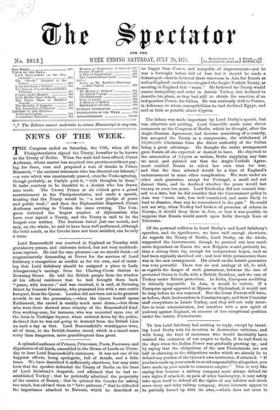The debate was made important by Lord Derby's speech, but
was otherwise not exciting. Lord Granville made some clever comments on the Congress of Berlin, which he thought, after the Anglo-Russian Agreement, had become something of a comedy, but accepted the Treaty as a compromise, the withdrawal of 10,000,000 Christians from the direct authority of the Sultan being a great advantage. He thought the entire arrangement gave Russia all she expected or desired to have. He objected to the annexation of Cyprus as useless, Malta supplying any base we need, and pointed out that the Anglo-Turkish Agree- ment enabled Russia to select her own time for war, and that the time selected would be a time of England's embarrassment in some other complication. We were under no other such guarantee except for Portugal, a small and not distant State, and he doubted whether the peace would last twenty or even ten years. Lord Kimberley did not commit him- self to a date, but he did consider that the Government policy in Asia was "more rash, less well considered, and more likely to lead to disaster, than any he remembered in the past." He could not see why, when Turkey had broken all promises of reform in Europe, it should keep them in Asia, or how it was possible to suppose that Russia would march upon India through Kars or Erzeroum.


































